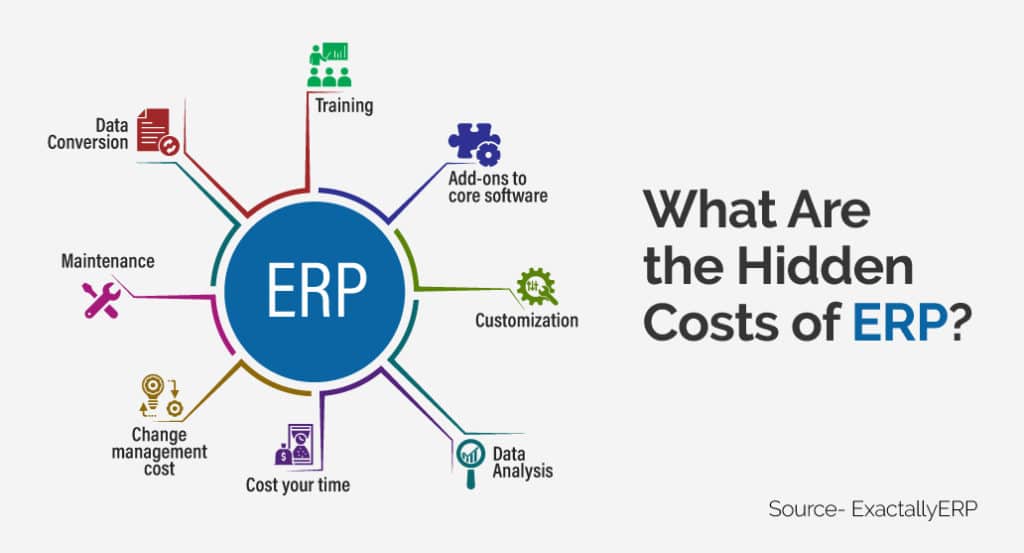
Enterprise Resource Planning is unarguably one of the most important investments companies should make. It is one of the successful keys to unlocking the doors of success for manufacturing organizations.
Looking at the future of the market, reinforcing production units with digital transformations is something that must happen.
But ERP implementation is an expensive program. It requires appropriate planning, budgeting, and adequate research.
As in the case of ERP, insufficient preparation and planning often end up in a huge financial failure.
Hence, it is necessary to know the ins and outs of the implementation process, including the hidden costs behind it.

Justifying The Cost-
The most underestimated aspect of ERP implementation is its cost. In most cases, companies take no notice of tracking and controlling the cost of ERP.
As a result, enterprises experience a significant exceed in what they have estimated.
As per ERP implementation veterans, the most likely reason for experiencing cost overrun is the lack of knowledge.
Fear not—continue reading to know about the hidden costs that indirectly get applied to you.

To keep the organizational functioning continuous, it’s necessary to migrate the complete data to the new system.
The data accumulated through years acts as a base, the building block on which the company grows. However, this data is too big for humans to deal with.
So, for its successful migration following standards should be met:
- Accuracy
- Integrity
- Completeness
- Uniformity
Meeting these criteria makes data migration projects even more complex with significant costs and risk involved.
To avoid cost overrun organizations develop organizations must develop a comprehensive plan encompassing people, processes and technology.
Moreover, this time-consuming process needs people to execute it.
And engaging office employees hinders the ongoing crucial projects.
This creates a need for adding temporary staff to complete the task of data conversion, which indirectly contributes to increasing the implementation budget.

Training Cost-
A company implementing an ERP system will have the primary objective of upskilling the employees in a new set of processes.
And without proper assistance, employees will find it hard to understand its core functioning. Hence, training investment must be there in your checklist.
Nevertheless, the cost of training is often overlooked by companies.
This is because it is difficult to calculate that cost accurately.
Moreover, for a place where employees have worked on a spreadsheet since forever, the new ERP solution can be a challenge to adapt to.
That’s why most of the employees might need multiple training sessions to work on it comfortably.
So, be prepared. Training sessions, both ongoing and post-implementation, will indirectly add up to your ERP budget.
Customization Cost-
Even if the vendor has tried their best to incorporate the best possible features, every ERP requires a bit of change because every business is unique and so are their processes customization of ERP is done to incorporate some specific features/modules according to the needs that standard ERP does not address. And this adds to the implementation cost.
Moreover, upgrading the customized ERP system, while expanding operations is again a laborious, and expensive task to perform. And hence, this cost of scaling ERP, though not immediately, in near future will act as a hidden cost.
Testing Cost-
ERP testing is the fundamental process that needs to be performed before the full launch.
Without ERP testing the chances of implementation failure increase and might result in complete crashing during the go-live process.
So, to create an ideal ERP, that works seamlessly with the organizational processes, it has to go through multiple testing sessions.
These sessions help in determining its flaws so that they can be fixed soon.
After fixing the imperfections, the ERP again undergoes testing and keeps on following this until it becomes a quintessential product.
Initially, the testing starts with a single transaction, and later on, multiple transactions are performed.
This repetitive process of testing indirectly costs a significant amount to the organization, which is often overlooked.
Customer Dissatisfaction-
When an ERP, with a wide range of capabilities, is created, it does not necessarily fulfill every organization’s needs.
Sometimes, organizations discover that the ERP doesn’t match fully and falls short at some points. This leads to customer disappointment.
So, at such times, the ERP needs some corrections, and the vendor has to get the desired changes done.
This undefined extra cost contributes to an overrun in the ERP budget.
Resistance of Employees for Change-
What remains constant in a business is “change” and restricting that change is basic human nature.
It becomes hard for everyone to incorporate something new than the usual routine.
Similarly, ERP becomes the biggest change employees can encounter in their corporate life.
Though ERP boosts digital transformation and reduces human efforts, still many organizations face resistance from employees for this.
Generally, employees react in three different ways towards it:
- Those who accept the change willingly and get ready to learn new skills.
- Those who are neutral towards the change and are ready to learn if handholding sessions are provided.
- The last ones are those who completely oppose the changes and deny putting efforts.
To modulate such obstacles, companies need to train their employees with a few informative sessions organized by the vendor itself.
In which the change specialist trainer himself provides the training, which might get extended due to unwillingness of few employees.
Such incidents lead to an increase in the ERP budget.
Conclusion-
It’s evident that ERP is a feature-rich management software that helps achieve the highest level of workflow efficiency.
But, on contrary, implementing an ERP system is a complex undertaking project.
The organization, that is about to adopt ERP, may suffer extreme disruption and inconvenience if it does not work as per the needs.
Hence, before getting it implemented, it is suggested to perform a cross-departmental analysis to determine the workflow issues that need to get solved with ERP.
Also, if your company too, looking for a result-oriented change with ERP software, do contact our team of experts today.



















